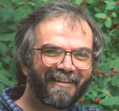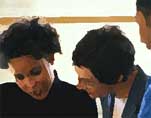Interview with Loring "Terry" CoesPresidential Award for Secondary Mathematics Teaching, 1988 |
 |
During his elementary, middle, and high school teaching career, Terry Coes has had the opportunity to develop his presentation skills at the local, state, and national levels. Terry began making presentations in the field of mathematics education in 1982 and started presenting at large events through his Woodrow Wilson Fellowship and after his Presidential Award. Terry currently teaches high school mathematics at Rocky Hill School, an independent K–12 school in East Greenwich, Rhode Island.
How did you get started in giving presentations?
I gave my first presentation in 1982 at a small state forum on problem solving. It was relatively easy to get on the program, which is often true. I gave some examples of things that had worked well for me in the classroom. I enjoyed that experience so I gave another talk at the Association of Teachers in Mathematics in New England conference in the early 80s. The big break through came in 1987 when I was a Woodrow Wilson Fellow, and that catapulted me into the large arena of giving talks. I became a Presidential Awardee the next year and continued to give talks at NCTM regional and annual meetings and at state meetings.
What advice would you give to a teacher who wants to get involved in giving presentations?
People don’t usually realize that program chairs and organizations are eager to get people to talk. They are always looking for new people. If you look at NCTM programs and other conference programs, there's a very stable list of characters, and the same people show up all the time. It’s always nice to have a mix of old and new. Also, program chairs absolutely understand that it takes a while for people to get comfortable giving presentations.
The biggest barrier people have is thinking that the good stuff that they do is ordinary and that people don’t want to hear about it. Usually that’s not true. If you have something that works in class, or works with certain kinds of kids, often people don’t do it the exact same way you do it. If something works well in class, there is an audience for it. Often you need a little boost from colleagues to convince you to share your ideas in a presentation. That's something that a Presidential Awardee can do for people. It’s a great boost. Another thing to keep in mind is that people don’t mind seeing old stuff done differently. People like to see their own ideas validated. It’s a confidence builder to see somebody else doing what you're doing.
Start by making presentations on a small scale, such as a presentation to colleagues at your own school or your own department. Then you can move up to giving a half-hour session. Many conferences have a short format available. It’s a nice way for people to get their feet wet giving presentations. After doing a few of those, then go on to larger state or national presentations. Also, attend other conferences. Go to a lot of presentations until you reach a point where you think ‘I can do this, too.’ I think being part of the professional community, working with other teachers, and attending conferences is part of getting your feet wet as a presenter.
Another piece of advice for presenting is to make it clear that you're having a good time. A presentation usually won’t go well if you feel so uncomfortable that you avoid eye contact and look at the floor or at the slides all the time. I make sure to be energetic and look at the audience. Look for eye contact or people nodding their head. This will give you an indication of how the presentation is going over with the audience.
How do you make yourself more comfortable and confident before giving a presentation?
Well, I actually do a better job if I’m a bit anxious. If I’m really relaxed and I’ve given the same talk a few times before, I’m apt to be very flat in the presentation. I’m better off if I give myself a little bit of new material to look at, use a new slide, or rearrange the order of the talk a bit. That helps keep me on my toes. Try to anticipate what questions you're going to get. I think it’s natural to be nervous and I encourage people to be keyed up.
How do you juggle your teaching responsibilities with making presentations?
I like making presentations, but I think you need to make sure that you keep your priorities in order and that you measure the impact on your family and life. You need to be sure that what you're doing outside the classroom has a direct connection to whatever you're doing inside the classroom. When you're spending time outside the classroom, make sure it’s really helping you do a better job in the classroom. I think you also need to be able to say no. With Presidential Awardees, there are a lot of new opportunities that are going to pop up and you want to say yes and no thoughtfully. If you say no, you're apt not to be asked again and that’s something to consider. But if you say yes, you’ve got to do a good job. I think those are personal judgments you have to make.
What advice would you give to teachers presenting to parents?
In my experience, parents want to know some pretty basic things. They want to know if the material will prepare the kids well for the next course and for college. They absolutely want to know about the usefulness of this material in terms of the SATs. That’s an anxiety that parents have. It’s part of the reality for kids and parents so you need to address that. I think we can prepare kids for the SAT in the context of teaching good mathematics. An issue that comes out with parents and with school boards is how the program compares to programs at other schools. I think that’s an issue that you need to address, and it usually can be addressed well if you're doing a good job.
Another question that parents often have is ‘If the math of 1970s was good enough for me, why isn’t it good enough for my kid?’ There's always the perception that things used to be better. That’s an issue that you need to address well and there are many important things you can say. For example, there's plenty of evidence that during World War II it was very hard to find anybody who had any command of basic arithmetic. The portion of people lacking basic mathematics skills was higher than it is now. However, now it’s easier to measure. Everybody gets tested many times in early life and so it’s easier to document failure. In the past, we never did such massive testing of the entire population. So that’s an argument to bring up. Also, the world is different: technology has had a major impact on the way people learn mathematics and what they need to learn.
What advice would you give to teachers presenting to the state education committee?
First, you need to make sure that the audience you're talking to is going to listen to you. Legislators might not want to hear from teachers as much as they want to hear from college professors, and that’s an issue you need to be realistic about. If you do speak to legislators, you have to be respectful. You should present your position in a positive, constructive way. You shouldn’t whine. Say your most important points first and think in terms of sound bytes. If you have an opportunity to speak to legislators, you probably will not have a lot of time to speak.
Make sure you're talking about what you know about best of all—things related to the classroom—and keep it out of the political arena. If you start to venture off into areas where you're not an expert, it’s going to show. Don’t say things that you can’t back up. You should be able to cite the research that supports what you’re saying. You can also make a disclaimer that the information is what you’ve gained in your own experience as a teacher. If you're not a published expert on a particular issue, don’t make claims about that issue.
What advice would you give to teachers giving a hands-on presentation?
I think it’s just like any teaching situation. First, pick a good problem or task. Then make sure your stuff works. If you're doing things requiring technology, make sure the computers work. Test it out ahead of time because the last thing you want to do is reinforce the frustration that people have with technology. Also, make sure you have enough materials and manipulatives for everybody.
If you're doing a workshop, you want to make sure that any good ideas are thoroughly discussed and practiced before you push onto something else. Don’t rush. It’s a case of quality over quantity. It’s also not a bad idea to announce your goals at the outset so that you and the participants are on the same page.
What advice would you give for presenting to a group of teachers you don’t know?
When I’m presenting to a new audience, I work the audience a little bit before the talk. I’ll walk up and introduce myself and ask a few questions. That just gives me an ice breaker and allows me to recognize some of the people I’m presenting to. I try to establish some sort of bond, even it’s a tiny one, with part of the audience beforehand. You can also poll the audience to find out what subjects they teach, what grades they teach, and so forth. You can do that to get a very informal sense of what the audience is like.
How do you think your experiences in mentoring and coaching contribute to the advancement of mathematics reform?
One of the driving ideas behind the Woodrow Wilson Master Teachers Program is that teachers can and should teach teachers. We have much to learn from each other. Teaching teachers has added vitality and excitement to my own career, and I think that I have helped some others along the way. My personal impact is not measurable, I’m sure, but the system where this has happened has pushed education forward.
If you have any questions you would like to ask Terry Coes about
his experiences making presentations, contact him at lcoes@aol.com.

